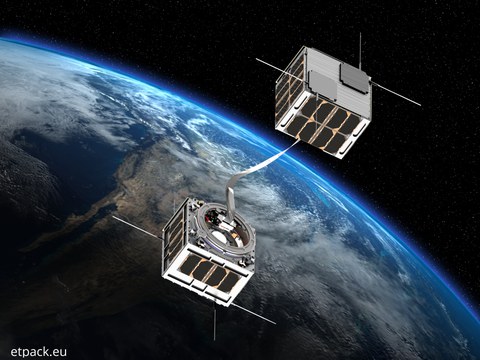21.11.2024
Ohne Treibstoff ins All: Forschende der TU Dresden entwickeln innovative Satellitenantriebe

Visualisierung des Tether-Satelliten aus dem Vorgängerprojekt E.T.PACK.
Durchschnittliche Satelliten wiegen oft mehrere hundert Kilogramm. Ein Großteil des Gewichts entfällt auf den flüssigen oder gasförmigen Treibstoff. Raketenbetreiber tragen hohe Kosten, um sie ins All zu bringen. Die Professur für Raumfahrtsysteme der TU Dresden forscht daher gemeinsam mit anderen internationalen Universitäten und verschiedenen Unternehmen an treibstofflosen Antriebssystemen, um Satelliten im Weltraum zu steuern.
Bei herkömmlichen Antriebssystemen entfällt – abhängig von der jeweiligen Mission – bis zu 90 Prozent der Satellitenmasse auf Treibstoff. Das im Projekt E.T.COMPACT („Compact and Propellant-Less Electrodynamic Tether System Based on in-Space Solar Energy”) entwickelte Antriebssystem hat das Potenzial, die Satellitenkosten erheblich zu senken beziehungsweise den Anteil der nutzbaren Satellitenmasse, etwa für wissenschaftliche Experimente, Antennen oder Kameras, deutlich zu erhöhen.
Das neue Antriebssystem nutzt ausschließlich Sonnenenergie. Lange, leitfähige Bänder, sogenannte elektrodynamische Tether, sind am Satelliten befestigt. Bei der Bewegung durch das Erdmagnetfeld erzeugen diese Tether eine Spannung. So entsteht ein geschlossener Stromkreis zwischen dem Tether und der umgebenden Plasmaatmosphäre (Ionosphäre). Die dabei auf das leitende Band wirkende Kraft wird als Lorentzkraft bezeichnet. Dieses Prinzip kommt auch in klassischen Elektromotoren zum Einsatz. Tandem-Solarzellen speichern die erzeugte elektrische Energie. Sie bestehen aus zwei photovoltaischen Solarzellen aus den Materialien CIGS (Kupfer-Indium-Gallium-Diselenid) und Perowskit.
Eine der größten Herausforderungen in diesem Prozess ist das Schließen des Stromkreises. Forschende des Instituts für Luft- und Raumfahrttechnik entwickeln daher innovative, treibstofflose Elektronenemitter. Diese Emitter ermöglichen es den Elektronen, das Leiterband in Richtung Atmosphäre zu verlassen und so den Stromkreis zu schließen. Die Entwicklung und Erprobung der Elektronenemitter erfolgt in den Weltraumsimulationskammern der Professur für Raumfahrtsysteme.
E.T.COMPACT hat eine Laufzeit von drei Jahren und wird vom European Innovation Council (EIC) im Rahmen des Pathfinder Programms gefördert.
Kontakt
Prof. Dr. Martin Tajmar
Professur für Raumfahrtsysteme
TU Dresden
Tel.: 0351 463-38091
E-Mail:
